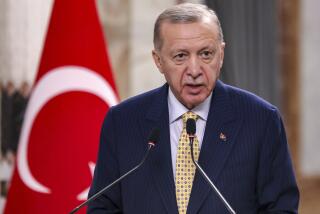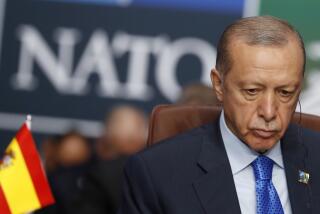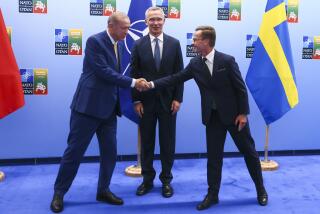National Agenda: Turkey : Turks Now Asking: Who Needs the EC? : * Western Europe may not want it to join the club. But the Muslim nation is already modernizing, increasing two-way trade with the Community and forging a place in the world.
- Share via
ISTANBUL, Turkey — “Turkey, the only Muslim state to have created a republic and secular nation state, has knocked on the door of the European Community. She awaits your reply.”
Thus did Turkish President Turgut Ozal, then prime minister, sign off his book “Turkey in Europe,” which put forth his argument for the EC to accept Turkey’s April, 1987, membership application.
Four disappointing years later, Ozal has updated the work and is still knocking. But now, he says, Turkey waits “fully aware that both Turkey and the Community can survive without our full membership.”
Technically, the question of Turkish membership in the Community remains open. In a polite rebuff in December, 1989, the EC said it would not be in a position to discuss the issue until after completing work on a unified European market, scheduled for the end of 1992. But many analysts are convinced that if Turkey is ever going to be taken into the Community, it won’t be for many, many years.
Meanwhile, Turkey’s enthusiasm for membership seems to be waning.
Consider, for example, Istanbul’s EC Institute of Marmara University, set up during an idealistic flush in 1986 and located in a building named after EC founding father Jean Monnet. Nowadays, the institute director is rarely seen more than once a week. Enrollment has been static at two dozen students a year, and objectives have changed.
“The first students were full of idealism. They used to say, ‘When we join the Community . . .’ ” said one lecturer who declined to be named. “I haven’t heard that for a year. They all now want to be lawyers or businessmen.”
Students like Gul Erden, 25, say they are simply more realistic. “I believe Turkey is European, otherwise I wouldn’t be here. But we’re accustomed now to the thought of not being accepted as a member.”
With only 3% of its territory in Europe, Turkey has already been judged by much of Western Europe as significantly different by almost every measure. EC parliamentarians put Turkey’s poor human rights record at the head of the list, but there is much more.
With a fast-growing population of 57 million, Turkey would become the biggest country in the EC within a generation. But its gross national product per capita is barely $2,000 a year, and purchasing power is a third of the EC average. Its heavily subsidized agriculture and high unemployment would cripple Community budgets.
“Let’s not be fatalistic, but maybe a little pessimistic,” Dutch Foreign Minister Hans van den Broek told Turkish reporters last month before his country’s six-month EC presidency.
With or without EC membership, however, Turkey’s two-way trade with EC members is steadily rising, from 42% of its exchanges in 1988 to 60% in 1990. Communications, television and foreign currency laws are already on a level typical of southern Europe.
While Turks once feared that they would be left on the outside of the European common market, that concern has faded. For one thing, the EC is no longer seen as becoming, inevitably, an insular bloc. While Turkey may be relegated to a status similar to that of the new democracies of Eastern Europe, that will still mean some cooperation with the EC.
Further, Turkey has already started diversifying its political horizons.
“Turkey is more interested in getting on with practical developments, the new relationship with EFTA (European Free Trade Assn.), the promising Soviet relationship, its wish to play a Mideast role,” said the EC ambassador to Turkey, Michael Lake.
The Gulf crisis has also accentuated Ankara’s close alliance with Washington--President Bush will visit Turkey in July--but U.S. diplomats have tried to pour cold water on Turkish pressure for a free-trade-zone agreement with America.
“We are looking at that but would prefer to see Turkey in the EC,” one American official said privately. “But the problem is that the Europeans are in fact far more racist than they like to let on.”
There are indeed many raw nerves in the relationship, founded in the EC-Turkey Association Agreement of 1964, signed during the Cold War when Turkey was a key member of the NATO alliance.
Official political contacts under the agreement have been frozen since a 1988 argument over Cyprus, and most financial aid has been blocked since the 1980-83 military takeover. Customs harmonization, envisaged by the agreement by 1995, is way behind schedule, as is free movement of labor.
Recently, a European-Turkish media war over Turkey’s handling of the Kurdish refugee crisis has eroded European popular approval of Ankara for supporting the Western alliance in the Gulf crisis.
“There was a great deal of gloom among Community ambassadors,” EC representative Lake said.
An official EC opinion poll in May did show 55% of Europeans were in favor of Turkey’s entry. But that placed Turkey only 10th, ahead of Albania, on the preference list of 11 potential EC members.
The Turks themselves feel a strong Western drive--epitomized by the reforms of Kemal Ataturk, founder of the Turkish republic in 1923--but have had difficulty in deciding exactly what their own place in the world should be.
Some Turks feel stronger bonds to the Central Asia of their ancestors than to their European neighbors, who were historical enemies as the Turks marched west under dynasties such as the Ottomans, repulsed from the gates of Vienna in the 16th Century.
Turks still name their babies after Attila the Hun or Genghis Khan, not the likes of EC founder Monnet. One Turkish football team even calls itself the Golden Horde after the fearsome Mongol army.
European history books often end a first stage of Western civilization at 1453, when the Turks brought down the Byzantine Empire with the capture of Constantinople, now Istanbul. Turks, however, regard this as a glorious foundation stone of their history, re-enacted each year outside Istanbul’s city walls.
But there is still much diversity underneath the nation-state ideology with which Ataturk united a country that included millions of immigrants from all over the old Ottoman Empire, from the Arabian Peninsula to Yugoslavia.
President Ozal now publicly calls Turkey a “mosaic” of cultures, including the native Kurds, and this is gaining wider acceptance in the country.
Some EC diplomats talk cynically of Turkey’s Muslim character. But the Turks have been westernizing since reform-minded Ottoman sultans ruled in the 19th Century, and most analysts believe they are not about to stop.
The spread of tourism, prosperity, education and television is still making Western values more common even in remote villages, with or without EC membership.
“My parents knew no foreign language. We are now learning our second languages,” said EC Institute student Tuba Ustuner, 24. “With this generation the education gap will close. This generation wants to be part of Europe as a whole.”
Straddling Continents Although Turkey has a toehold in Europe, most of the nation lies in Asia. Its Muslim faith, rapidly growing population and poverty set it off from most members of the 12-nation European Community. Many oppose admitting it to the EC. Population growth rate 1988-89 EC average: 0.358% Turkey: 2.3% Gross domestic product per capita, 1990 Turkey: $1,950 EC average: $18,100 Unemployment rate, 1988 Turkey: 15.5% EC average: 10.5% Annual inflation, 1990 Turkey: 65% EC average: 5.1% Sources: OCED Observer, June/July 1991; Turkish Foreign Economic Relations Board; Turkish State Institute of Statistics; European Community.
More to Read
Sign up for Essential California
The most important California stories and recommendations in your inbox every morning.
You may occasionally receive promotional content from the Los Angeles Times.













